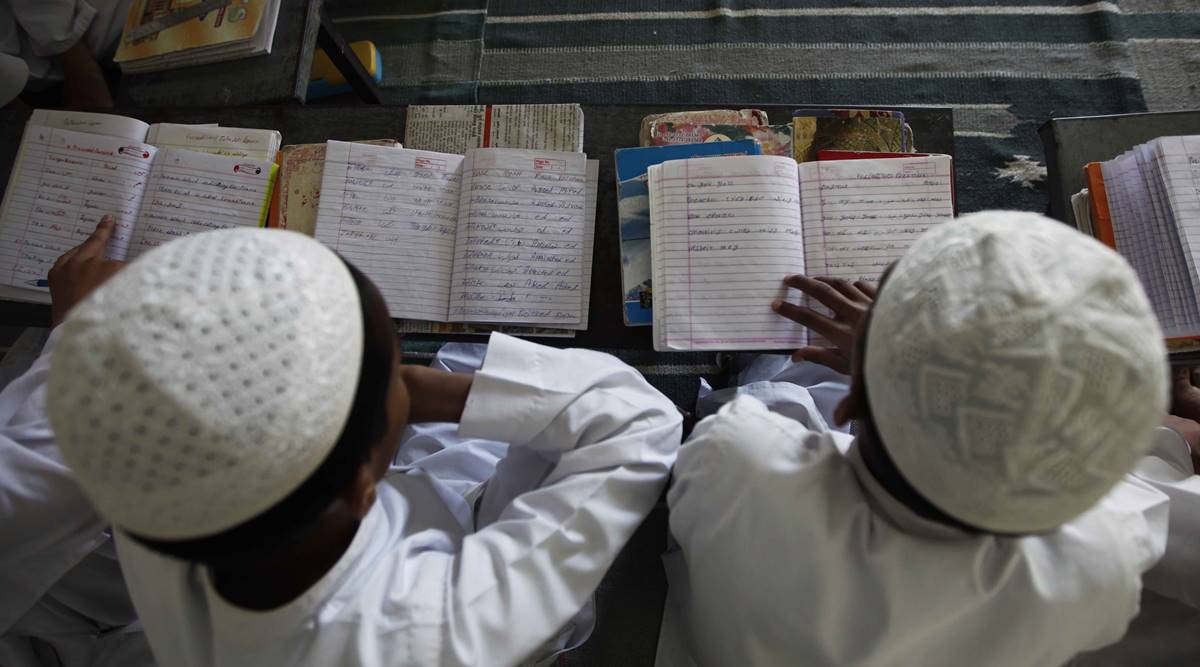 As per the new syllabus, the language of instruction would be Urdu and school texts will be also in Urdu. (Representational image)
As per the new syllabus, the language of instruction would be Urdu and school texts will be also in Urdu. (Representational image)THE Bihar Madrasa Education Board has decided to adopt a “modern and mainstream syllabus” in the academic session that began this April, including options for students to choose from science, arts and commerce after Class 10, and adoption of SCERT and NCERT textbooks. Over 10,000 teachers were given online training during the lockdown, by experts including the Unicef, to be able to teach the courses.
The Bihar madrasa board has over 4,000 madrasas affiliated to it, including 1,942 government-aided, with over 15 lakh students. It has been holding online classes for the students.
As per the new syllabus, the language of instruction would be Urdu and school texts will be also in Urdu. Students, however, will have English and Hindi as separate subjects. The entire syllabus has been uploaded online on their website for the help of students, Bihar Madrasa Education Board Chairman Abdul Qaiyum Ansari told The Indian Express. An app has also been launched for students to access the material.
Like students enrolled in the Bihar board, the madrasas would prescribe SCERT textbooks till Class 10 and NCERT ones in Class 11 and 12. Islamic studies would remain a part of the curriculum from Classes 1 to 10.
Chairman Ansari said, “We realised that only studying Arabic would not suffice. We want our students to learn all subjects, like others, while studying Islamic courses. We want them to compete with the world.”
Ansari said the uploaded content includes over 800 videos on the new syllabus. “We are also booking slots on Doordarshan to run our classes. We have been taking online admissions as well.”
The Bihar madrasa board is an autonomous body under the state government and fully funded by it.
The Uttar Pradesh Board of Madrasa Education, among the largest in the country, also follows the CBSE syllabus since 2017, with the addition of theology. The Central government has a voluntary Scheme for Providing Quality Education in madrasas to ensure that children in these institutes receive teaching as per “the national standards” in formal subjects.
S A Moin, a senior consultant with Unicef, Bihar, said “the complete paradigm shift” in the state had been in the planning since a 2017-2018 Unicef study called for sweeping changes in the existing system. “Starting November 2019, the madrasa board started workshops with experts. After several rounds of workshops, we revised the syllabus.”
He pointed out that there is hardly any syllabus in the current system. “Books are randomly referred for subjects. We now have a combination of pragmatic syllabus and Islamic studies. Those who want to be maulvis and excel in religious studies have a separate stream.”
The Unicef study showed that the madrasas in Bihar had no teachers for science and maths, and except for one, none had a laboratory or a library. Girls were enrolled in good numbers in madrasas, many of which also had hostels, but facilities such as furniture were lacking.
Madrasas were found to have no learning materials, or provision of training for teachers.
Pramila Manoharan, education specialist with the Unicef, said they got a very warm response from teachers during training, conducted by Unicef experts along with those from the SCERT, NCERT, Jamia Millia Islamia University in Delhi, and the Bihar Education Department. “They were very enthusiastic about the new and modern methods of study,” she said.
The state madrasa board plans to next develop an app to monitor teaching as per RTE norms, on the lines of BEST (introduced by the Bihar Education Department to maintain data on teachers, students and infrastructure). Ansari said they also plan to tap into the state government’s Unnayan app, including animated videos, for online classes.
Of the 1,942 government-aided madrasas, with 7.8-lakh-odd students, 1,733 are up to Class 8 (Wastaniya), 119 up to Class 10 (Fauqaniya), 55 up to Class 12 (Maulvi), 22 up to graduation (Aalim) and 14 up to post-graduation (Fazil).